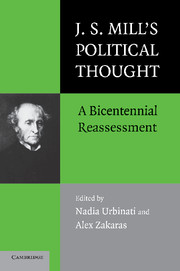Book contents
- Frontmatter
- Contents
- List of Contributors
- Introduction
- PART ONE LIBERTY AND ITS LIMITS
- PART TWO DEMOCRACY AND THE INDIVIDUAL
- 6 Bureaucracy, Democracy, Liberty: Some Unanswered Questions in Mill's Politics
- 7 Mill in Parliament: When Should a Philosopher Compromise?
- 8 John Stuart Mill, Individuality, and Participatory Democracy
- 9 Mill's Neo-Athenian Model of Liberal Democracy
- 10 John Stuart Mill on Education and Democracy
- PART THREE BEYOND NATIONAL BORDERS
- Bibliography
- Index
8 - John Stuart Mill, Individuality, and Participatory Democracy
Published online by Cambridge University Press: 08 January 2010
- Frontmatter
- Contents
- List of Contributors
- Introduction
- PART ONE LIBERTY AND ITS LIMITS
- PART TWO DEMOCRACY AND THE INDIVIDUAL
- 6 Bureaucracy, Democracy, Liberty: Some Unanswered Questions in Mill's Politics
- 7 Mill in Parliament: When Should a Philosopher Compromise?
- 8 John Stuart Mill, Individuality, and Participatory Democracy
- 9 Mill's Neo-Athenian Model of Liberal Democracy
- 10 John Stuart Mill on Education and Democracy
- PART THREE BEYOND NATIONAL BORDERS
- Bibliography
- Index
Summary
Two hundred years after his birth, John Stuart Mill's interpreters still disagree about the extent of his commitment to democracy. Many maintain that he was a reluctant democrat, working subtly to insulate government from the vicissitudes of public opinion. These critics usually hold that Mill was above all a liberal who believed that personal liberties would always be too important to entrust fully to the demos. Others disagree sharply, insisting that Mill was a radical democrat, even by twenty-first-century standards, and that his ambition to justify broad new avenues for public participation was restrained only by his belief that the British public was not yet completely prepared (but would eventually be) for the fullest self-government.
Recent scholarship has strengthened this latter reading by clarifying the breadth of Mill's participatory ideal: Mill wanted citizens to participate not only in national elections, not only in regular “conferences” between elected representatives and their constituents, but also in local government and adjudication, in volunteer militias and worker-owned cooperatives. Those who defend this view of Mill emphasize his belief, influenced by Alexis de Tocqueville, that participation was part of what made citizens capable of conscientious self-government. Like Tocqueville, Mill describes the practice of democratic politics as a “school of public spirit” and contrasts it favorably with a private life that he imagines dominated by the prerogatives economic self-interest (CW XIX: 412). The transformative effects of public participation form, on this reading of Mill's philosophy, the very heart of his democratic theory.
- Type
- Chapter
- Information
- J.S. Mill's Political ThoughtA Bicentennial Reassessment, pp. 200 - 220Publisher: Cambridge University PressPrint publication year: 2007
- 4
- Cited by



